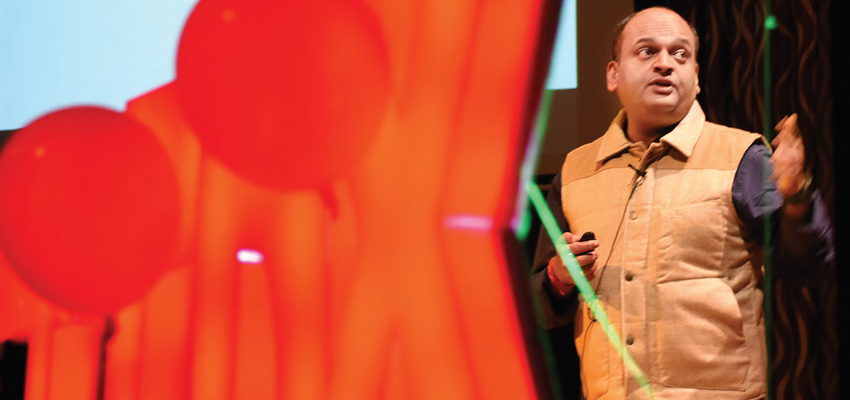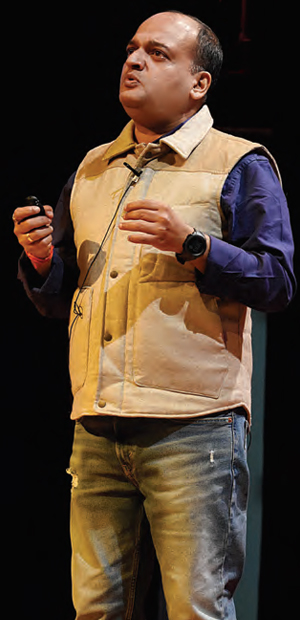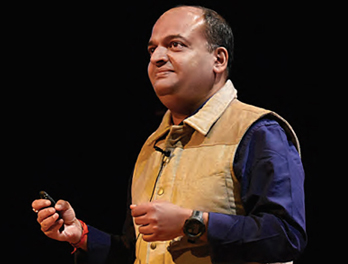Explore and Experiment

From not aspiring to be a UX designer to currently hiring designers to help build PhonePe, a digital wallet platform and online payment company, Navneet Nair has made significant contributions to this industry. Presently, he is serving PhonePe as their Director of Product Design. He is someone who believes in having a strong vision but with a flexible plan and has certainly worked in his favour. When things do work your way for long, grabbing the next best thing is always a smart move, he says. In the recently concluded online session, Navneet spoke candidly about his vibrant career journey, taking chances, patterns in life and career, and much more
"Internships are like a Minimum Viable Product or an MVP for a student’s career. You should be using them to test the water and see what works for you
In his career spanning over two decades, he has developed several products for the who’s who of this industry. He has learnt a great deal while working for companies like Google, Yahoo, Ogilvy and now PhonePe. With an adaptable career blueprint, Navneet always intended to produce intricate designs that fit so beautifully into the rapidly evolving business environment. He enunciates his first-hand experience of his journey.
OF CHILDHOOD ASPIRATIONS
I still take pride in saying, as a child, I wanted to become a postman when I grew up. When I was young, I used to collect stamps, and to me, my dream job was something that would let me be around stamps all the time. Well, that is long gone now. Luckily for me, I never stuck with the plan of becoming a postman for long. To be honest, I hardly stuck to any plans at all. I am not saying that one should not plan, but what I intend to say is being flexible with the plan is always a smart move.
As a grown-up, my first real interest was in the sciences, especially space. I was fascinated by Carl Sagan and the series 'Cosmos'. The thirteen- part television show aired in the 80s and 90s covered a wide range of scientific subjects, including the origin of life and a perspective of our place in the universe. On the same lines, there was a similar show with Neil deGrasse Tyson, an American astrophysicist, planetary scientist, author, and science communicator.
Not just that, later, I tried to infuse the love for space and science with an affection for mechanics and physics. That is what motivated me to try and pursue a career in Aeronautics. However, when the time came, I failed to get in. Now, this is not one of those inspirational stories of how people tell you that you should try and try again till you succeed. No, I’m not one of those guys. I just took whatever closest option I had in front of me. At that point, it was Mechanical Engineering.
However, about a year into Engineering, I realised that my heart was elsewhere. I wanted to create stuff. And I could not see myself doing that as a Mechanical Engineer. Now, I’m not saying that there are no creative jobs in Mechanical Engineering, I was just not aware of the possibilities at that point.
"When I think about the patterns in life, I have noticed that I was always stubborn about the vision but my openness to manoeuver the plans accordingly served me well"
- Navneet Nair

LEARNING NEW THINGS
During my college days, I did explore and experiment a lot when it came to learning new things. And that opened several new doors for me. There once came a shiny object on my radar. I had a cousin who worked in the advertising field at that time. And through him, I got a peek into the creative and glamorous world of advertising. I wanted to try my hand in advertising. Specifically, copywriting. And rather than waiting for the next four years to finish my degree, I took the easy way out. No, I did not drop off. I started making posters for college events and during vacations, I took up internships with advertising agencies.
In software development, we have a concept called the ‘Minimum Viable Product’ or an MVP. This is a stripped-down version of the product that you release to a small audience to test out the feasibility of the actual product. It is a low-risk and low-cost way to test the waters.
Just like that, internships are MVPs for a student’s career. You should be using them to test the water and see what works for you. People today use internships to keep a score so that you can add it to your resume. Do not do that. Take up as many internships as possible with some of the best mentors you can get a chance to work with. This will tell you if that job or career is something worth pursuing.
And even if you love your internship, my advice is to finish your course. Unless of course, you are 100 per cent sure that your million dollars idea is executable. Well, at least, I finished my degree, and it helped me later when it was time for me to apply for my masters.
So, looking back, one of the things that stand out for me, during my time in college, was the courage to experiment. And college is the best time in life where you can freely explore and experiment. Try to do this as much as possible.
DECIDING ON THE NICHE
Even though I explored a lot during my college days, I still managed to finish my degree with good marks. However, I had already made up my mind to join an advertising agency. So, I did not apply for any engineering jobs, instead headed out to drop a few resumes to some of my shortlisted advertising agencies. And since I was applying to advertising agencies, I had to make sure that my resume stood out.
For that, I created a resume that looked like a donation box with the headline ‘Contribute to the brain drain’. I dropped it at several advertising agencies. This was before there was email, so I physically went around Mumbai to advertising agency offices to drop these boxes off. It caught the attention of a creative director at FCB-Ulka and I was offered a job as a copywriter.
I loved it at the advertising agency. The fast-paced and glamorous life was addictive. I was working long hours and, quite frankly, I loved it. I also started progressing fast. Apart from winning awards, one of my dreams was to work with Piyush Pandey, an advertising stalwart. And in four years I found myself working as a Senior Copywriter at Ogilvy, Mumbai.
ALL ABOUT THE INTERNET ERA
In the year 1995, the Internet was launched in India. Soon, I got its access at my workplace. I was fascinated by the possibilities that it opened. Internet in those days was fairly rudimentary. However, the potential was evident even at that point. There was a web browser named Mosaic that I used to access a site named Yahoo.com. Little did I know at that point, that sometime in the future I would be working for Yahoo!
One of the things that changed the course of my life completely, was a software released by Macromedia, called Flash. In those days, bandwidth was limited. And most webpages were made up of text with small images. Animation, if any, were only in the form of erratic animated gifs which were not appealing. Flash changed all that. Suddenly, it was possible to deliver beautiful and smooth vector animation in a fraction of the bandwidth. As a creative producer, I could see that this was a game-changer. I downloaded a one-month trial of Macromedia Flash on to my old Pentium computer. I played with it by creating amazing animations. There was no YouTube in those days, so when someone said they were self-taught, they meant it. Flash did become an important part of the Web 2.0 revolution. My foresight served me well.
The web was nowhere mainstream at that time and I had no way of working in an industry that did not exist. So, by working on weekends, I taught myself how to build websites using HTML and Flash. And I took every opportunity to create websites for the clients as side projects. This allowed the agency to look as if they were in tune with the latest technology and at the same time permitted me to work on real-world problems. This, you see, is another pattern that has helped me in life. The capacity to constantly course-correct has always worked in my favour. And this requires both agility and flexibility. These are both traits that will help you in the long run as well.
"Mastery comes with being good at what you do. Autonomy comes with being the one in control of your output. If you can fulfil an unmet need, the chances of you being in control of your output are extremely high"
A GAMBLE THAT PAID OFF
When I think about the patterns in life, I have noticed that I was always stubborn about the vision but my openness to manoeuver the plans accordingly served me well. I joined O&M in the year 1999 and was working on print and TV advertising with some of the best ad folks in the country. But I knew the immense potential that the online space held. So, I took a tough decision and quit the lucrative job to pursue a Masters in Multimedia Design, which was a completely new field. And I decided to pursue it in a country that very few people went to study in those days. I went to Australia.
I would love to say that this was a carefully planned strategic move. But that would be lying. I left a well-paid and sought-after job on a whim that this is the technology of the future. I went to study a course that was started just one year before in a country that was not popular for students in those days. Now, this was a stunt, a gamble, that paid off. But while it was a gamble, I did have some safety nets in place. I had experience and skill that I could always revert to and I was carrying forward some of the value that I had created by working in advertising. I had simply transformed it.
Before I made my move from Engineering to Advertising, I had done a lot of groundwork to make sure that I would like the work and had developed enough basic skills that would allow me to perform well in the new position. I did the same when moving into design. Thinking a few steps ahead in planning your career is always a good move, but never let the plan stop you from achieving your goals. As Dwight Eisenhower said, “Plans are nothing. Planning is everything.”
PURPOSE AND PASSION
As per me, follow your passion is not a piece of sound advice. You see passion is not inherent in you. You are not born with a passion for a particular thing, which is a measure of your intrinsic motivation. It is more important to find your purpose in life than to look for passion. We need to be aware of our purpose every moment in life. But then how do we find our purpose in life.
As for intrinsic motivation, according to Daniel Pink, that is a combination of three things-mastery, autonomy, and purpose. Mastery comes with being good at what you do. Autonomy comes with being the one in control of your output. If you can fulfil an unmet need, the chances of you being in control of your output are extremely high. Which leaves us with the last part-purpose.
One way is to use the Japanese technique called ‘Ikigai’ which is ‘The reason for being’. It is an intersection of what you love, what you are good at, what you can be paid for and what the world needs.
Now I would love to say that I found my Ikigai early in life, but the truth is that even today I’m trying to find the balance between these four factors. With every correction I’ve made in life I have come closer, but a true balance has always been elusive. However, I feel, we should not be too worried if we do not find our life purpose immediately. Give it time and you will find it. However, we need to develop one quality which is self-awareness.
"Find work that is engaging and meaningful. Reduce distractions in life as much as possible. And finally, define your values and purpose"

WORK-LIFE BALANCE
The core teachings about mindfulness will help us develop several virtues. I had a good fortune of being exposed to mindfulness practices at a young age. And while I did practice it for a few years, as I grew up, other habits ate into my meditation time and I found myself forgetting all about it. Till I had a bit of a rude awakening. Stress and related health conditions had started to take over my body and I found myself taking the practice up again. It started with small 10-minute sessions about 20 years ago which have now become a regular habit. I don’t start the day without my regular meditation session and take at least one annual 10-day meditation retreat.
OVERCOMING THE SOCIAL MEDIA DILEMMA
At Google, I used to work with the social team and the product I worked on was called Orkut. Back then, Orkut was the biggest social network in India. Now, as the designer of the product, I needed to know how the product worked so I spent a lot of time on it. I also spent an inordinate amount of time on competing products. I was, to say the least, a social media junkie.
In one of the recent documentaries, The Social Dilemma is where the tech experts sound the alarm on the dangerous human impact of social networking. Interestingly, I was designing these tools and was aware of the tactics that we used to keep users hooked to the site. However, on a subconscious level, I was falling prey to them as well.
Well, that was not new for me as I have always been an active creator on the internet and have had a blog running since the year 2000. When you have a blog, there is a large amount of time you spend creating content for it. But there is an even larger amount of time that one spends promoting it. This inordinate focus on the non-core part of the work is a time waste. It takes attention away from activities that can enrich your life and career.
Today, I have some strict rules about devices and apps. I have uninstalled most of the social media apps on my phone and keep myself logged out of all of them. This additional hurdle of having to log in before using it stops me from checking the sites often. Also, not having the app installed on the phone means there is no constant barrage of notifications.
Each notification that you attend to disturbs your flow and it can take up to 20 minutes to get back into the flow. This is highly inefficient. Turn off those notifications, and you will realise that the world does not want to get those instant replies to Facebook or WhatsApp messages. And the world will not fall apart if you do not know how many likes your Instagram post got in the last hour.
Apart from that, during work time, I have an app that blocks out distraction and only allows it during a strict break time. The world does not care to hear from you. So, it is best to reach out only when you have something important to say.
FOR ALL THE FRESHERS
Explore and experiment: You must understand it’s now or never. Our early 20s are all about exploring and experimenting. I feel that one should make use of the time available during their college days. The experience that you garner while learning and experimenting with new things will have a huge effect on you.
Holistic approach: Develop a foresight and become agile. These virtues are a state of mind that can be cultivated. Nothing is inherent in you and you have the potential of achieving anything. Be stubborn about goals and not how you achieve them. While goals are important, just because you encounter a minor roadblock, it should not deter you from it. Neither should you be so overcome by the problem that you stop making rational choices.
Internships are crucial: Internships are like a Minimum Viable Product’ or an MVP for a student’s career. You should be using them to test the water and see what works for you. People today use internships to keep score so that you can add it to your resume. Do not do that. Take up as many internships as possible with some of the best mentors you can get a chance to work with. This will tell you if that job or career is something worth pursuing.
Do meaningful work: Find work that is engaging and meaningful. Reduce distractions in life as much as possible. And finally, define your values and purpose. This is a lifelong process.